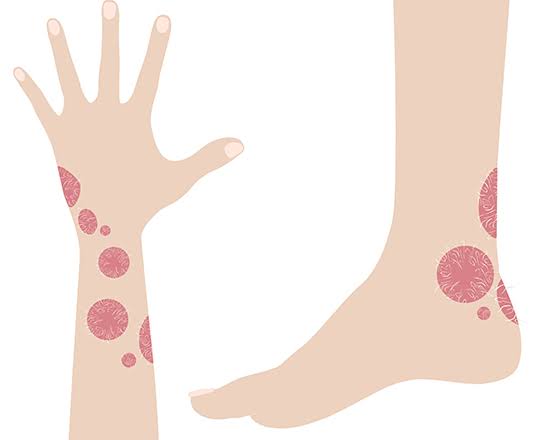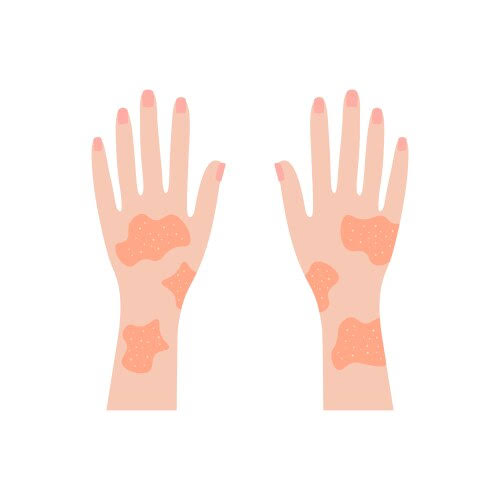A widespread chronic skin ailment affecting millions of individuals worldwide is psoriasis. Although it can be difficult to treat, there are some alternatives, such as homeopathy. We will examine the basics of psoriasis in this beginner’s guide, covering its definition, pathophysiology, kinds, causes, risk factors, indicators, and symptoms. We will also discuss general management, investigations, and preventive strategies related to this illness. Find out how homeopathy can be a useful tool for reducing psoriasis discomfort.

Understanding the Basics
The fast and uncontrollably growing skin cells that characterize psoriasis are a non-contagious skin condition. The result of this overgrowth is the development of elevated, red, and frequently scaly patches on the skin. Known as plaques, these spots can be unattractive and painful. Although psoriasis mostly affects the skin, it can also cause psoriatic arthritis, a condition where the skin becomes inflamed.
What Happens Beneath the Surface?
Psoriasis pathogenesis stems from an overactive immune system. Our immune system normally defends us against illnesses and infections, but in psoriasis, it mistakenly attacks healthy skin cells. Inflammatory chemicals are released as a result, causing skin cells to proliferate quickly and gather on the skin’s surface to form plaques.
The Types of Psoriasis
There is not a single treatment for psoriasis. Psoriasis comes in a variety of forms, each with special traits of its own. The most typical kinds consist of:
1. Plaque Psoriasis: This type is the most common and is characterized by crimson, elevated plaques that are covered in silvery scales.
2. Guttate Psoriasis: This form causes tiny, drop-shaped lesions and is frequently brought on by a streptococcal infection.
3. Inverse Psoriasis: This kind manifests as smooth, red, and inflammatory patches and is found in skin folds.
4. Pustular Psoriasis: Usually affecting certain body parts, this condition is typified by pus-filled blisters.
5. Erythrodermic Psoriasis: This severe and uncommon type of psoriasis results in skin that is red and peels.
The Causes of Psoriasis
Although the precise etiology of psoriasis is still unknown, the following elements may play a role in its development:
1. Genetics: Since psoriasis tends to run in families, family history is important.
2. Immune System: Psoriasis may be brought on by an overactive immune system.
3. Illnesses: Guttate psoriasis can result from a number of illnesses, particularly streptococcal infections.
4. Environmental Factors: For certain people, psoriasis can be made worse or started by stress, damage to the skin, and excessive sun exposure.
Who Is at Risk?
Although anyone can have psoriasis, there are some risk factors that could make the condition more likely to impact you:
1. Family History: Your risk is increased if you have psoriasis in your family.
2. Age: Although psoriasis can occur in anybody, it most frequently affects individuals between the ages of 15 and 35.
3. Stress: Excessive stress can intensify flare-ups or worsen the symptoms of psoriasis.
4. Obesity: Having excess weight might make psoriasis worse.
5. Smoking: Smoking raises your chance of getting psoriasis, especially pustular psoriasis.
Signs and Symptoms of Psoriasis
Psoriasis symptoms and indicators can differ from person to person and might alter over time. Typical signs and symptoms include:
1. Red, Elevated Plaques: These can develop on different body locations and are frequently covered in silvery scales.
2. Itching or Burning: Psoriasis lesions have the potential to be uncomfortable and unpleasant.
3. Dry or Cracked Skin: Psoriasis patients may experience dry, easily cracked skin.
4. Thickened, Pitted, or Discolored Nails: Psoriasis can result in pitted, thickened, or discolored nails.
5. Pain and Swelling in the Joints: Psoriasis that affects the joints can result in psoriatic arthritis, which also causes pain and swelling.
For prompt diagnosis and treatment, it is essential to comprehend the symptoms and indicators.
Investigations of Psoriasis
It is crucial to get an accurate diagnosis from a healthcare provider if you think you may have psoriasis. In addition to doing a physical examination, they could request the following investigations:
1. Skin Biopsy: To determine whether psoriasis is present, a tiny sample of skin is removed and examined under a microscope.
2. Blood Tests: These are useful for determining the degree of inflammation and ruling out other illnesses.
3. Nail Clippings: Nail clippings may be inspected under a microscope if nail psoriasis is suspected.
General Management of Psoriasis
A comprehensive strategy is needed to manage psoriasis, which frequently includes lifestyle changes, topical drugs, systemic treatments, and phototherapy. Even though many people have found success with conventional treatments, more and more people are using homeopathy as an adjunct to their management techniques.
Here are some general management strategies for psoriasis:
1. Topical Treatments: These comprise shampoos, ointments, and creams containing active components such as vitamin D and corticosteroids. When it comes to mild to moderate psoriasis, they are typically the first line of treatment.
2. Systemic Medications: Oral or injectable drugs may be recommended in more serious situations. Biologics and immunosuppressants are two examples of them.
3. Phototherapy: Under regulated circumstances, exposure to ultraviolet (UV) rays can help control the symptoms of psoriasis.
4. Lifestyle Modifications: Keeping up a healthy lifestyle that includes stress reduction, a balanced diet, and frequent exercise can have a big impact on symptom control.
Homeopathy and Psoriasis: The Holistic Approach
Because of its all-encompassing approach to healthcare, homeopathy is a complementary and alternative medical system that has grown in popularity. It entails the use of extremely diluted chemicals to promote the body’s inherent healing mechanisms. Homeopathy takes into account the physical, emotional, and mental components of the patient in order to treat the underlying causes of psoriasis.
Here are some homeopathic remedies commonly used for psoriasis:
1. Sulfur: For dry, scaly, unhealthy skin that is prone to suppuration, where scratching and heating exacerbate burning and stinging. Three times a day, three pills.
2. Arsenicum Album: Good for psoriasis characterized by rough, scaly, dry skin that exacerbates in cold weather and when scratching, usually flares up in the rain or after midnight. Dosage: 3–5 tablets, three times a day.
3. Petroleum: Works well for hand psoriasis, which is characterized by dry, sensitive, rough, cracked skin with greenish crusts and itching that gets worse in the presence of moisture. Dosage: 3–5 tablets in potencies ranging from 3–200C, three times a day.
4. Arsenicum Lodum: This remedy is great for psoriasis that causes dry, scaly, and itchy skin. It also causes noticeable exfoliation of the skin in huge scales.
5. Mercurius Solubilis: Especially advised for psoriasis that aggravates with heat and excessive sweating, especially at night and in damp, wet weather. Dosage: 3–5 tablets in potencies ranging from 2–30C, three times a day.
6. Sepia Officinalis: Suitable for psoriasis that worsens in the knee and elbow bends, itches that are not helped by scratching, and releases an unpleasant stench.
7. Mezereum: For psoriasis characterized by oozing, thick, leathery crusts and excruciating itching that gets worse at night.
8. Rhus Toxicodendron: Good for red, swollen, and painful joints associated with psoriasis, and may also help reduce psoriatic arthritis symptoms.
9. Graphites: Good for constipation and a propensity to gain weight in addition to thick, seeping, honey-colored discharge from psoriatic lesions.
It is crucial to remember that a licensed homeopathic practitioner who can customize the treatment to your unique symptoms and needs should be the one to administer homeopathic medicines.

Conclusion: Cheers to Healthy Skin!
While psoriasis can be difficult to manage, people can live happy, fulfilling lives if they have the necessary information and tools. An extensive explanation of psoriasis, including its causes, risk factors, signs and symptoms, investigations, general management, and preventive measures, has been supplied by this beginner’s guide. We have also looked at the possible advantages of homeopathy as an additional means of treating psoriasis.
Keep in mind that controlling psoriasis can be a journey that calls for perseverance and patience. See a medical specialist to find the best course of action for your unique situation, and think about speaking with a licensed homeopathic practitioner about your alternatives. You can take charge of your psoriasis and live a better life with the correct assistance and care.
Reach out to us for a Consultation
For any queries, reach out to us at contact@homeopathic.ai
This blog is for information purposes. It’s crucial to note that while homeopathy is a centuries-old practice with many adherents worldwide, always consult a qualified homeopath or medical professional before initiating any treatment.





